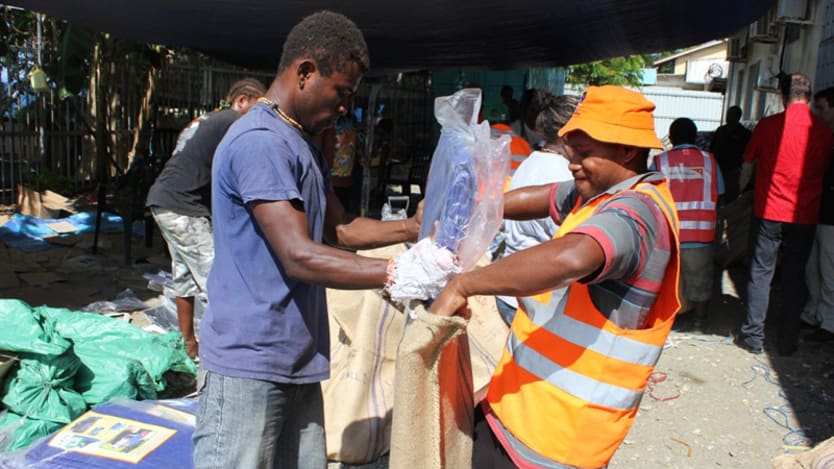
For aid professionals, discussions around localization are not new. But in the wake of the “Grand Bargain” reached last year at the World Humanitarian Summit, organizations and donors are knuckling down over how to aim resources to meet the goal of shifting 25 percent of funding to the local and national level.
“It’s still early days in terms of working out what does it really mean,” said Peter Walton, director of international at the Australian Red Cross. “How do we measure it, how do we know we’re really moving in the right direction?”
On Thursday, the ARC and researchers from Fiji and Vanuatu presented their early work into localization research in the Pacific. Speaking at the Asia Pacific Humanitarian Leadership Conference, the group discussed their “walking the talk” approach, which is part of a larger research effort to be unveiled in coming months.
See further related topics:
► Opinion: The power of local capacity building
► Thanks but no thanks: Unwanted goods flood disaster-struck developing countries
“There is actually not a huge range of evidence, and a lot of it is aspirational,” said Fiona Tarpey, manager of the international strategy and policy team at the ARC. All of the current research on localization is written by international actors, noted Tarpey, and very little of it is context-specific. Because the ARC already relies heavily on a localized network, understanding the shortfalls fit well with its mandate.
“Localization is part of our DNA,” said Tarpey. “But even with the structure we find it difficult. The current system is not set up to support local actors.”
To that end, the ARC commissioned research exploring localization in the Pacific region, with the goal of uncovering what a localized disaster response could look like.
Railala Nakabea, the deputy head of the department of public health at Fiji National University, is one of the local researchers. Her working group spent four days designing a research methodology rooted in local practices.
“I come from environmental health and public health background, everything based on legislation … so it was a learning tool for us as well,” she said. One of the main outcomes, explained Nakabea, was the decision to meet with stakeholders and informants in a talanoa, a traditional method of engaging in frank discussion rooted in local culture.
“It’s like a chat, a group discussion session. We sit around in a comfortable room and can suss out all the questions and issues scheduled for the session,” Nakabea explained.
By relying on culturally-specific research methods rather than those imposed by outside actors, the team is hoping to facilitate a level of open dialogue rarely seen. But that is just a single benefit of many. In an insight paper compiled by the team, numerous advantages of localizing research are highlighted. Such efforts save money, improve local ownership and ensure the right stakeholders are engaged.
There are “obvious and not-so-obvious” benefits,” explained Linda Kenni, an independent researcher from Vanuatu who worked on the project. Kenni recounted working as a translator for foreign researchers who couldn’t understand why the group had to speak with a community leader before accessing a particular village.
With localization in research, there can be “two-way” learning, said Kenni. “The local consultants have the opportunity to learn from their international counterparts, and the international counterparts can learn from the local consultants.”
Employing local consultants, said Kenni, not only can be more cost-effective and time-saving, but it pumps money back into the local economy and engenders a high level of vested interest.
And while the impact of the “Grand Bargain” has yet to be seen, the team is hopeful that further research will pave the way to better programmatic outputs.
“We think it requires a dramatic paradigm shift to redefine the relationships between international and local actors,” said Tarpey. “We want this research to influence this dialogue.”
Devex is the media partner for the inaugural Asia Pacific Humanitarian Leadership Conference. Follow discussion from the conference on Twitter using #bethechange.




